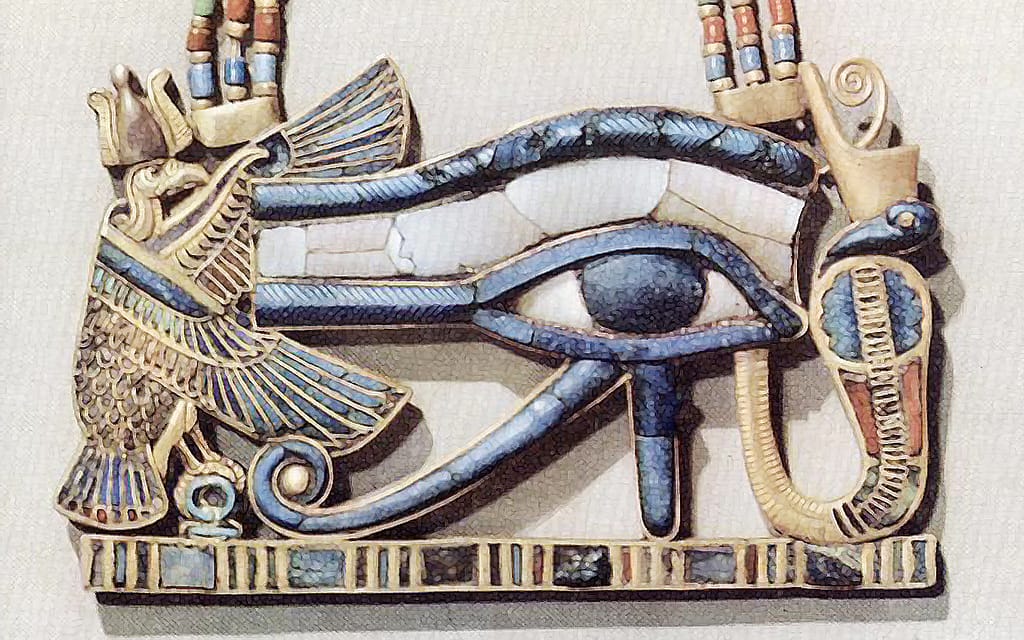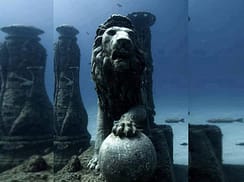
Anceint Egyptian signs and symbols Source: http://www.depositphotos.com
Talismans and amulets in ancient Egypt
Queen Cleopatra made the Egyptian asp snake famous when she chose to use it’s venom to commit suicide. But did you know the Asp snake is a powerful Egyptian symbol.
Talismans and amulets are still today very much part of popular culture in Egypt and seem to have a firm place in people’s belief in the supernatural. The belief in the supernatural, or magic, is something which has existed in Egypt for thousands of years and will probably remain forever. Every where you go in Egypt you are surrounded by thousands of years of history so there is little wonder why symbols, talismans and amulets remain so important.
Some amulets, symbols and talismans were thought to be more powerful than others and many local areas had their own symbols. There were symbols which were used all over Egypt and the most popular were Ankh, the Asp snake, Mau cat, the eye of Horus, Scarab beetle, Lotus and the Benu bird.

Symbol of Ankh Khnum Temple Esna Egypt Source: Healthyannie
Egyptian Ankh or the Key of Life
The symbol of Ankh which symbolizes eternal life was the most common symbol used in ancient Egypt. It is today known as the Key of Life and still much treasured.

Khnum Temple Esna Egypt Source: Healthyannie
Gods and Goddesses depicted on Egyptian temples and in scrolls are often seen carrying the Ankh symbol, or holding it to the nose of a deceased person. The meaning was for the deceased person to inhale the power of Ankh (eternal life) and take it with them on their journey.

The Nile delta – does this represent the symbol of Ankh from ancient Egypt? Source: http://www.britishmuseum.org
The interpretation of Ankh has been much debated, and one of the most popular beliefs is that is represents the Nile delta. This can possible be true as the Nile meant everything to the ancient Egyptians. With a little bit of imagination you can perhaps see the Nile delta in the loop, the long stem as the Nile and two “arms” as the West and East of the Nile river.
Most mummies were also buried with at least one Ankh symbol and often it was also found wrapped in their bandages. Mummification was a very important process and only certain priests were allowed to carry out mummification.

Ra- Kephri – the God Ra with Scarab beetle ancient Egypt Source: Cairo Museum
Scarab Beetle
The Scarab Beetle was a symbol of death and rebirth, and closely associated with the sun disk.
The ancient Egyptians believed that every dawn the beetle laid an egg. The egg represented the sun disk and during the day the beetle pushed this egg across the heavens only to begin the process again the next day.
When the female beetle died she was believed to be reincarnated from the sun, and new beetles emerged with her as she was born. The born again beetles were worshiped as Khepera or Khepri.
The beetle is also associated with the God Ra and he can be seen with a Scarab beetle for his head. In this form was he was known as Ra-Khepri.
Scarab beetles were also used during the mummification process. Small amulets of Scarab beetles were placed over the heart of the deceased and the beetles often had an inscription from the Book of the Dead written on them. The ancient Egyptians believed that this would protect the deceased and make sure his or her secrets were not given away during the final judgement by Osiris.

The Eye of Horus Source: British museum
Egyptian Eye – Eye of Horus
The Eye of Horus is ancient Egyptian symbol and it was commonly used as an amulet for protection. Today it is can be seen all over the world and seem to be ingrained on our collective memory. The Masons use it as part of their practices and it can also be seen on the American one dollar bill.
But do you know the story behind the Eye of Horus? Let me introduce to some Egyptian gods.
The Eye of Horus is believed to come from the God Ra. God Ra’s eyes represented the sun and moon. God Ra and God Horus became assimilated and one of the eyes represented the God Horus. In ancient Egyptian mythology another God called Seth was the enemy of Horus and poor Horus’s eye was hated by Seth.
Seth captured the eye of Horus in a battle and threw it in to the darkness where it shattered into pieces. God Thoth, another God who was one of the good guys, found the shattered pieces and restored it back to its original form. From that day the eye was known as the Eye of Horus or the Wadjet.

Lotus flower on the wall at Philae temple Aswan Egypt Source: Healthyannie
Lotus – the water lily of life
The Egyptian Lotus lily is first encountered in Egyptian creation myth. The ancient Egyptians believed that the Lotus had risen through the water of the chaos and this became really important as Amun had risen through the water after the flood. Amun then went onto create the universe and the world.
Lotus flowers became the symbol of life and kingship in Upper Egypt. They can be seen on the carvings on the majority of Egyptian temples and on papyrus. Tombs are often adorned with them and no river hunting or water scene is complete without them. Pillars of temples are also shaped liked lotus flowers emerging from the river Nile.
The ancient Egyptians were keen observers of nature and they may have noticed that there are two different types of lotus water lily. The blue one flowers during the day and the white one flowers during the night. During the day the white lotus flowers sinks beneath the muddy waters of the Nile.

Mummified cats

Mau killing a snake – oh yes they did Source: Healthyannie
Mau cat
Cats were protected in ancient Egypt as farmers realized they protected their fields and homes against vermin. This was an economy based on agriculture so crop protection was vital.
The modern Mau breed is spotted and it is a strong possible the original breed was also spotted.
The Egyptian cat goddess Bastet was the goddess of pleasure and she protected the population against evil spirits. Perhaps this is another reason why the cat become such a popular house pet and was worshiped.
You will find Mau cats depicted almost everywhere in Egyptian art and carvings, and cats are even depicted as hunting together with their human companions.They can be seen onboard hunting rafts on many preserved papyrus.
Cats were often mummified on their death and priests went to a great deal of trouble to preserve the cats well. There were special burial rituals for cats and recently a tomb has been found containing hundreds of mummified cats. They are in all different positions – sitting down, cleaning themselves, running, resting and playing.

Benu bird with the crown of Upper Egypt on his head
Benu bird – an Egyptian Phoenix
The Benu bird is another common sight on Egyptian temples, tombs and papyrus but unfortunately not a lot is as yet known about this particular symbol.
It was associated with Gods Ra, Atum and Osiris. The Benu or Phoenix myth appeared to have originated in Helioplis .According to current evidence there was a cult dedicated to the worship of the Benu bird.
It is in part a creation myth as it appears that the Benu bird could live for 1000 years. It would then build a funeral pyre which would ignite and burn into ashes. Out of the ashes a new Benu bird would arise and live for a 1000 years. Perhaps this is the origin of the story of the Phoenix.
The birds most commonly associated with the Benu bird was the stork, ibis, heron or flamingo.
The ancient Egyptian used to carry Ibis birds in baskets when they hunted in the marshes or reeds, and these amazing birds were used to kill snakes. A famous example of this was Moses’s invasion of Ethiopia.

The Egyptian Asp or Cobra
The Egyptian Cobra or Asp
There are a great deal of snakes in the Nile river valley so there is no wonder that the ancient Egyptians chose Cobra to raise this beautiful snake to God like status. Cobra are extremely powerful snakes and the ancient believed they possessed enormous power.
Cobras were the protectors of the Pharaoh however part of ancient mythology all seems to show us they could be thought of as evil. Gold jewelry shaped into Cobras were worn for protection and they are commonly seen in crowns, armbands and statues.
The ancient Egyptian God Apep was a snake. Apep was the god of evil and darkness. Ra and Bastet were his enemies. The three gods did battle every night, and at dawn with the light of a new day Ra and Bastet won the battle.
Snakes were thought of as dangerous in real life as well as the spirit world, and many of our modern day fears of snakes could have come from this. Perhaps even the idea of the snake in the garden of Eden originated in Egypt.
Egyptian Gods

Horus Source: Healthyannie

Osiris Source: From papyrus purchased in Egypt

Apep Source: Unknown

Bastet Source: http://www.britishmuseum.org
British Museum
One of the best collection of Egyptian antiquities treasures are the British Museum in London.
It is a real treasure trove of artifacts and it will give you a fantastic insight into the history of ancient Egypt. Of course there is no substitute for traveling to Egypt to see the pyramids and walk along the avenue of sphinxes in Luxor.
One of the best way to see and experience Egypt is to take a cruise on the river Nile. There are on cruise which starts from Cairo, and there are several cruises which start from Luxor.
Make sure you have a qualified Egyptologist on your chosen cruise as they will provide a wealth of information. Going on a cruise in Egypt, or traveling in Egypt, is a bit like time traveling. There are thousands of years of history in this vibrant, chaotic country.
The Egyptians are a welcoming people and so proud of their country. Have you packed your bags yet? Check out Egypt for yourself.
(via)





